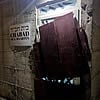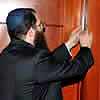Most years, Sara and Yoram Levi of Key West, Fla., enjoy a home-cooked dinner with their young children before going off to synagogue at the start of Yom Kippur. This year, however, with their home still in shambles from Hurricane Irma, they will be eating the traditional meal before Yom Kippur with about 100 other people at Chabad in Key West.
“We can’t cook in our house, and many others can’t cook in their houses either,” Sara Levi tells Chabad.org. “The supermarket doesn’t even have kosher chicken, so we will go to the meal at Chabad. Our head is not completely on Yom Kippur yet, but we are waiting to have a break from the routine.”
That routine now consists of living in a hotel while painstakingly cleaning their home from the devastation left after Hurricane Irma battered the Keys earlier this month with pounding rains and punishing winds of nearly 130 mph. The Federal Emergency Management Agency estimates the some 25 percent of homes in the Florida Keys were destroyed and another 65 percent damaged, many of them significantly.
“Our kids are doing OK; it’s more difficult for us and not them because they don’t know why we can’t go back home. We didn’t want to show them the damage at the house. We just told them we need to fix it,” Levi explains while she, her husband and their four children, ranging in age from 7 months to 6 years old, were having dinner at the home of Rabbi Yaakov and Chanie Zucker, co-directors of the Chabad Jewish Center of the Florida Keys and Key West.
Rabbi and Family Face Challenges
While the Zuckers have some electricity—“it goes on and off,” says the rabbi—they are facing their own challenges in their home and at the Chabad center they run.
There’s also storm debris and downed trees everywhere, and soiled furniture and damaged toys in the outside play areas. One of the family’s cars isn’t working, and at least one industrial air-conditioning unit at the Chabad House is broken. And there’s dangerous mold growing in their home and on the ceiling of the Chabad House, reports the rabbi.

Also not functioning is the oven at the Chabad House, which means that the Zuckers will prepare the pre-Yom Kippur meal and the break-fast at their home, and bring it over to the Chabad center for community members.
“It could have been much worse,” says the rabbi, “though my house still smells like rotten chicken. There were chickens in the freezer that fell out and defrosted during the storm. Hopefully, the smell will clear out soon.”
Though Zucker had returned to the island several times after the storm to bring in much-needed supplies and to check on congregants, he and his family only returned permanently after the end of Rosh Hashanah.
Since then, they have spent much of their time cleaning, helping to feed their neighbors and delivering honey cake to those in the area.

‘Places Are Struggling’
They weren’t working alone.
Zucker credits Rabbi Josh Broide, director of the Deborah and Larry D. Silver Center for Jewish Engagement at the Jewish Federation of South Palm Beach County and the outreach rabbi at Boca Raton Synagogue, with bringing down more than two-dozen teenage volunteers from the Donna Klein Jewish Academy and Katz Yeshiva High School of South Florida to help with cleanup efforts on Tuesday. Also joining them was Rabbi Boruch Liberow, co-director of Chabad Student Center in Boca Raton, which serves Florida Atlantic University.
“They really helped out a lot,” says Zucker, noting that they are trying to arrange for even more help because there is just so much need. “We could use another day of volunteering, and they said they will try and send another bus load on Sunday or Monday morning,” before the start of Sukkot.
Even before this week, people were stepping up to help out the community. He credits a charitable organization called Hands On Tzedakah, based in Boca Raton, with organizing food deliveries, emergency provisions and more.
Members of the Key West Jewish community, including the Zucker family, were even able to celebrate Rosh Hashanah together, thanks to Rabbi Yosef Biston, co-director of Chabad of Parkland, and also the regional headquarters for North Broward and South Palm Beach, Fla., who arranged spaces for some 30 people to join his congregation in celebrating the holiday at a local hotel.

The Levis were among those who participated.
“We didn’t know what we would have waiting for us when we got back to Key West,” attests Sara Levi. “We just heard from neighbors and saw a few pictures of how things looked, and then you worried about your home and your business.
“But during Rosh Hashanah, when we were with the Zuckers and some of our community, we got to relax, which gave us the strength to come back and deal with the cleanup, the insurance adjusters, everything.”
As Yom Kippur approaches and the Jews of Key West take a break from the repair work that has become a huge part of their daily lives, Zucker notes the pain people are now suffering as a result of a string of furious hurricanes in a season that’s not even over. First, there was Harvey, which devastated Houston and its environs; then came Irma, and its wrath in the Caribbean and throughout Florida; and most recently, Hurricane Maria tore a path over Caribbean islands, most notably demolishing Puerto Rico and leaving millions of people there in dire need.
“We ourselves went through Hurricane Wilma, which was a similar situation, and we had some tzuris from that and emerged stronger. We will be stronger this time, too,” he says, noting that the aftereffects certainly aren’t confined to Florida. “There are a lot of places that are struggling right now, especially Puerto Rico.”
“For the most part, G‑d doesn’t send challenges people can’t handle,” he says. “We’ll find the good behind all this, whether it’s people helping each other and the achdus, the unity, that’s come of it . . . or something else.”
Click here to help with Chabad’s relief efforts in Florida.









Start a Discussion